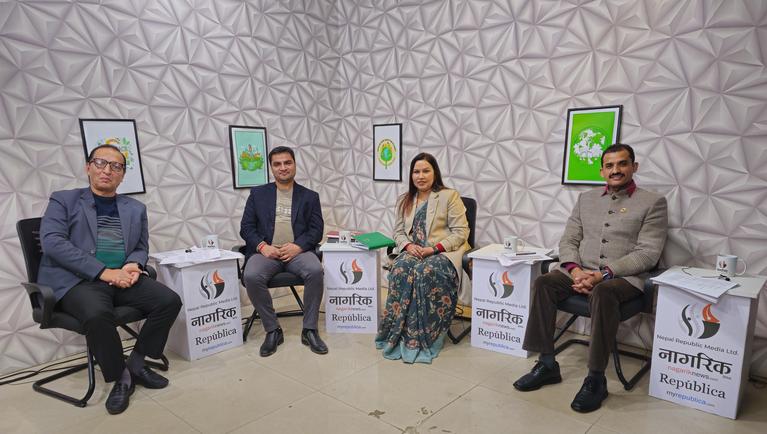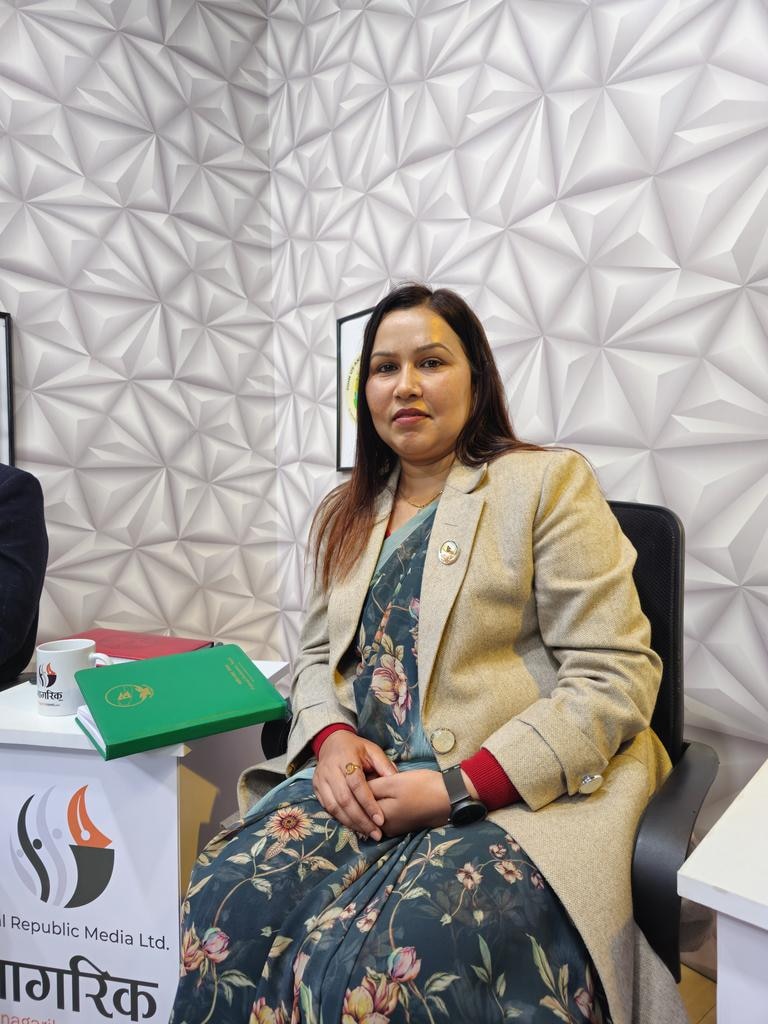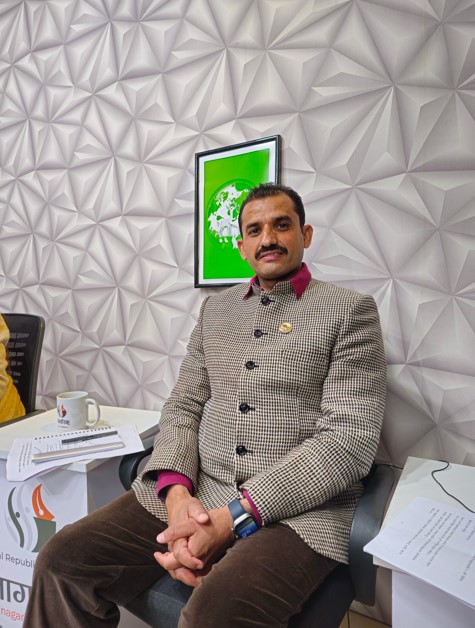
OR
Political commitment vital to effectively tackle climate change issue
Published On: January 9, 2024 04:35 PM NPT By: SHREE RAM SUBEDI

KATHMANDU, Jan 9: As the temperature of the earth is increasing, it has invited various climate related disasters around the world. In terms of climate risk in the world, Nepal is on the leading list. Every year, floods, landslides, melting and exploding glaciers, heavy rains, floods and fires are increasing.
Climate change has also affected people's livelihood, public health, and the economy of the country. Nepal has made policy arrangements and some structural arrangements to fight this challenge, however, their implementation does not tally with the seriousness of the climate crisis. It is impossible to address this challenge with other agencies and mechanisms alone unless there is political leadership and commitment.
In this context, the youth leaders of the three major parties and members of the House of Representatives participated in the dialogue held by Nepal Republic Media about the role of the political leadership, parliament and MPs in Nepal to address climate change.
Nepali Congress leader and MP Pradip Paudel, CPN-UML MP Sunita Baral and CPN (Maoist Center) MP Madhav Sapkota participated in the dialogue. This article is a summary of ‘Dialogue on Political Commitment in Climate Change’, a joint project of Nepal Republic Media and Climate and Development Dialogue.
It is unfortunate that climate change has not been made the main agenda yet
Pradip Poudel, Member of Parliament, Nepali Congress

There are many gaps in terms of what topics are included in the promises of our politics and political parties. There is a comment that specific topics have not been made into an agenda and the general public has not been satisfied and hopeful with these topics raised. The main issue to keep the people satisfied has been missed. It is unfortunate that climate change has not been made a priority so far. Especially the parliament, other legal structures of the country and the agenda made by the political parties determine how much priority is given to this issue of climate change. In various countries, there are separate ministries that deal with climate issue. They have assigned a separate minister and have promoted the issue as the main and primary issue. A separate committee has been formed in the parliament as well.
However, in Nepal, we are taking climate change in a general manner. At present, the positive aspect is that this issue is being discussed a lot in Nepal and even the state feels that this should be given adequate attention.
To response to the need of political commitement for climate change, We are trying to form a Climate Parliament in the Parliament. Some time ago I, Madhav Sapkota and Thakur Gaire went to Bagaladesh. We have seen that other South Asian countries have formed the Climate Parliament. We felt a need replicate it in our parliament. So efforts are underway in this regard.
Similarly, the question of how much carbon emitting nations have affected our environment and what they have given us in return is equally important. We have not done anything to pollute the earth's environment and change the climate. However, the industrialized and developed countries have played a very big role in polluting the environment. They have built their economic status through industrial production while we have not done that. Even when the environment is destroyed by others, it still affects us. We are suffering the effects of carbon emissions made by other countries. Therefore, by raising this issue in the world forum, we should have a system to get compensation for this. At the same time, our laws should make special arrangements for environmental protection and it is necessary for us to work with priority in solving the problems that have arisen due to environmental protection and environmental degradation.
Climate change is not only a problem of certain people and places. This is the problem of all people in the world. Therefore, this problem cannot be solved by any country alone. The world should work together to solve it.
When we talk about South Asia, the main cause of our polluted environment is the rampant use of fossil fuels. Therefore, it is now important to discuss as well as take initiatives from the regional level regarding how we can go ahead with the increase the use of green energy. Regional and collective efforts and networks are necessary for this.
There are many problems in South Asian countries. Nepal and Bangladesh gets flooded during rainy season.. In case the glacier melts in Nepal, it will affect India ,and Banglasdesh as well. The interests of India and Bangladesh and the whole world are linked in protecting the natural resources and ecosystem we have. Thus, climate mitigation initiatives need to be at the regional level.
In the last rainy season, about 700 megawatts of electricity was wasted in Nepal. On the other hand, Bangladesh has a great need for green energy. Nepal can help Bangladesh to achieve the its target of carbonreduction. Bangladesh can buy our electricity. India, which is between the two countries, should also help in this matter. Therefore, collective efforts should be made to solve common problems and challenges. It is beneficial to everyone when we exporting our excess electricity. This also helps to protect the environment and address climate change.
In particular, after forming the Climate Parliament in Nepal, we want to investigate what we can do at the SAARC level and what we can do together with the rest of the world. We plan to move forward by formulating laws, policies, and priorities accordingly.
The most important thing needed right now is that the state should make necessary laws in this regard. The effort of the state should be seen in parliament as well. There are various thematic committees in Parliament, a separate committee related to climate should be formed. It seems that the state should prioritize and build a permanent mechanism to combat the climate crisis. There are various ministries in the government, it is necessary to create a separate ministry to lead and deal the issue of climage change, and climate finance.
Despite the urgency, climate change was not discussed to the required level in the parliament. Now, it is taking place in various levels, be it at parliament, internatioonal forum and local level.
Recently, the Prime Minister has strongly raised this matter in the international forum and it seems that the government is also working hard to address various negative impact of climate change.
Similarly, there has been many discussions regarding connecting the issue of climate and environment in the law-making process. We are raising the issue of climate impact in Nepal and even when we go to the international forum. However I think that we should be more aggressive in the international arena.
Even within the country, we should accept the climate issue as the first and foremost issue. There should be no political differences regarding this. Parliament and the government should be able to take this issue seriously as the aspect of climate justice and ensuring the future of the next generation are added to it.
I heard that at one time when there was a terrible epidemic of AIDS in South Africa, 40 percent of the budget was spent on controlling the disease. While we should invest to solve the climate change issue, we can also earn enough if we adopt rieghtg policies and approach, with making climate change our main priority. For example, by producing electricity and clean energy, we can generate our own source of income. We can increase our independence. While we have huge potential for this, we are just not able to utilize this.. If we embrace the opportunity of clean energy development, Nepal can contribute to prevent environmental degradation in South Asia. For this, the barriers and obstacles should be removed.
Similarly, it is necessary to pay attention to how each person can contribute to climate change, raise awareness regarding it. Also, the state should make the right policies and laws, make necessary structures and move forward with priority.
Nepal can take the lead in climate change:
Sunita Baral, CPN-UML

Climate change is such an issue in which actions taken in one corner of the world, have a direct impact on another corner of the world. In the context of Nepal, this has had an effect and its impact is visible in different forms.
I want to share my experience from Jhapa. Kachankabal village of Jhapa, which is at the lowest altitude above sea level in Nepal, is a very rich place in terms of biological diversity. The animals and plants that are not found elsewhere were found there. However, at present this biodiversity is on the verge of being endangered. Whether we have been able to protect them or not may be another part of the discussion, but climate change is the main reason for this. This is a fact that Nepal is suffering from the impact of climate change like any other place in the world.
Meanwhile, Nepal has yet to be able to play a significant role within the country by using the resources it has when it comes to the issue. Here, a review is a must in whether we as people's representatives have been able to raise awareness regarding the issue of climate change.
Secondly, we should also focus on the state policy. While we are actively participating in many forums of the world and raising this issue, we are not able to work by making policies and laws within the country.
The climate issue is a hot topic around the world in the present scenario. While we are aware of its effects, if we can have the same level of awareness and initiative in trying to solve and minimize this, Nepal can help and make the world aware of global climate change control. Nepal is the best country in the world to take the lead in this issue as it has mountains, natural resources, and biological diversity.
Similarly, our actions show that there is no political unity to face this common challenge. For example, in 2020, it was said that the Everest Dialogue would be held with the topic of climate change at the center. Many countries of the world were ready to participate in it. But that could not be organized due to the COVID-19 pandemic. The recent government has not shown any interest in organizing it.
A few months ago, at an event in Europe, many European parliamentarians asked me when Nepal would hold the Everest Dialogue. After that, I raised the issue of continuing this program in the Parliament and with the Minister of Foreign Affairs. However, there was no proper agenda regarding this program that has so much concern and interest from the international level. Later, it was said that the program will take place, but that has not happened yet.
Similarly, the political parties may have a theoretical disagreement with political issues. However, such topics and programs that have a long-term impact should not be linked with the dimensions of political color and government change. We have to work consciously with the responsibility of continuing it. It should be able to advance in a balanced and fair manner.
At the recently concluded COP-28, we said that 'Climate change waits for no one'. This was necessary but to implement it, we need to continue the programs in the existing plan and develop new programs according to the needs.
Similarly, awareness in the public level is equally important. From household carbon emissions caused by burning wood to the emissions caused by explosions in the Israeli-Palestinian war, they hurt the earth's environment. In this sense, we need to explain the sensitivity of the climate crisis to everyone.
When talking about Nepal, our laws are scattered and many ministries and departments are involved in this matter. Therefore, every person needs to understand this challenge. One plan, one person, program and reference cannot solve this challenge, so if a unified law can be made to deal with climate change, it will be easier to deal with this issue and the implementation can be strengthened. In the context of federal Nepal, the activity of various components of the government is desirable.
Special circumstances demand a separate body (authority) to deal with Climate Change in Nepal
Madhab Sapkota, MP, House of Representatives
 At one stage, climate change was a matter of science and technology, now it has come to the fore as geopolitics and diplomacy. The challenges connected with this issue have also come forward terribly. But if the world accepts this challenge positively, then there are also many opportunities at the same level.
At one stage, climate change was a matter of science and technology, now it has come to the fore as geopolitics and diplomacy. The challenges connected with this issue have also come forward terribly. But if the world accepts this challenge positively, then there are also many opportunities at the same level.
Various studies and surveys have shown that the people who own land and water should and will be the 'supreme' in the world. Nepal is also at high risk in terms of climate change.
I represent Sindhupalchowk district. Let's discuss the Jure landslide that occurred in Sindhupalchowk a year before the 2072 earthquake. This massive flood-landslide happened in an unprecedented location, blocking the flow of the Koshi River for three consecutive days. Despite our efforts, we were unable to breach it. Ultimately, it was only cleared when the water level increases and couldn't sustain its weight.
Similarly, there was a significant flood in Bhotekoshi in the past. The unexpected flood was triggered by disturbances in the glacial lakes in the Tibetan region, leading to tragedy and losses in settlements and human communities downstream.
Recently, the storage accumulated for many years in the area of the Melamchi water source, i.e. in Bhimathanka area, collapsed and caused unimaginable damage to the lower riparian area. Here, along with the
vulnerablities triggered by the earthquake in Sindhupalchowk, we are witnessing effects of climate change in Sindhupalchowk.
In today’s context, it may be a local issue to build nature-friendly infrastructure, however, only the local efforts are not sufficient to deal with the issue.
For example, when talking about the flood of Melamchi, an expert has said that the flood occurred due to the collapse of the accumulated debris caused by earlier landslides. Similarly, about the Bhotekoshi landslide, the incident happened when there was a wave (vibration) in glacial lakes in the territory of Tibet. At that time, the lake did not burst, if the lake had burst, the settlements and citizens of the lower areas would have suffered terrible losses. Therefore, this subject is not only about science and technology, it has become a collective challenge. To deal with this, the whole world should be united. This issue will be solved only when those who have to fulfill their roles and responsibilities regionally and nationally will do so.
Nepal has committed to achieving net-zero carbon emissions by 2045, aligning with the goals outlined in the Paris Agreement. With only 22 years remaining to achieve this ambitious target, the timeframe appears relatively short. To work towards this objective, Nepal has outlined a plan to generate 15,000 megawatts of electricity by 2028, a significant step in reducing carbon emissions. The generated electricity will play a crucial role in transitioning towards sustainability, with a specific focus on the transportation sector. By the year 2030, Nepal aims for electric vehicles to constitute 90 percent of total private vehicle sales and 60 percent of public vehicle sales, contributing to the overall reduction of carbon emissions in the country.
In this way, it seems that Nepal is committed to the goals of the Paris Agreement. In this context, Prime Minister Pushpa Kamal Dahal has raised the issue of climate in internatioal forum inclusing COP 28, recently concluded in Dubai. Developed nations that have gained wealth through industrialization have played a negative role in climate change by emitting excessive carbon. Nepal is considered to be a storehouse of glaciers, glacial lakes and mountain ranges. We have made a great contribution to the world's natural systems. António Guterres, the Secretary General of the United Nations, said in the parliament that Nepal has contributed significantly to climate change in terms of its forest and forested land area.
However, a significant challenge in Nepal lies in the fact that the current energy policy does not adequately support agriculture and forestry. The existing policies tend to prioritize the preservation of forests over energy and agricultural needs. This presents a critical issue that needs addressing. Often, when formulating forest policies, the focus tends to be solely on forestry, neglecting the integral connections between energy, agriculture, and forestry. In reality, these sectors are mutually dependent, and a holistic approach is necessary for sustainable development.
Furthermore, considering the aspect of human development, earthquakes have destroyed homes while humans have also disrupted the natural habitats of animals and the delicate balance of ecosystems with plant life. Addressing these interconnected challenges requires a comprehensive and integrated approach that considers the symbiotic relationship between energy, agriculture, forestry, and overall environmental resilience.
It seems that emissions should be reduced while embracing this overall development. However, we should not forget the fact that we are a developing nation, we should also achieve economic development and prosperity of the country rather than just reducing emissions. For this, clean energy should be widely used as an opportunity. In particular, Nepal, India, and Bangladesh should move ahead with trilateral cooperation and understanding. Fortunately, the government has emphasized this. During the visit of the Foreign Minister of India to Nepal, the potential for electricity export is an important achievement.
Therefore, I believe that Nepal has to effectively raise its concern on the international stage. Countries that have not contributed to climate change but are facing its negative impact should get climate justice. Until now, it was like asking for climate cooperation from developed countries, but now this issue is a matter of the rights of a country like Nepal.
We will do whatever we have to do at the international, regional, and national levels regarding climate change. The parliament and the government of Nepal have moved ahead with this as a priority. The results will come soon. In the context of Nepal's scattered laws covering the issue of climate change, either these contradictions should be resolved, or else they should be unified.
If this cannot be done, a separate body (authority) should be formed by declaring a special situation for the next 10-20 years given the growing climate crisis, as was done in the 14 districts affected by the earthquake for the rescue and reconstruction during the last earthquake.
You May Like This

Climate change is hot topic in the European Parliament vote
LANGEOOG, May 25: Hungry tourists stream into the glass-fronted balcony of Michael Recktenwald’s restaurant on the German island of Langeoog,... Read More...

Bill to enable PM alone to recommend army mobilization
KATHMANDU, March 16: The government has registered a Security Council Bill at parliament, proposing special powers to the prime minister... Read More...






Just In
- Challenges Confronting the New Coalition
- NRB introduces cautiously flexible measures to address ongoing slowdown in various economic sectors
- Forced Covid-19 cremations: is it too late for redemption?
- NRB to provide collateral-free loans to foreign employment seekers
- NEB to publish Grade 12 results next week
- Body handover begins; Relatives remain dissatisfied with insurance, compensation amount
- NC defers its plan to join Koshi govt
- NRB to review microfinance loan interest rate











Leave A Comment